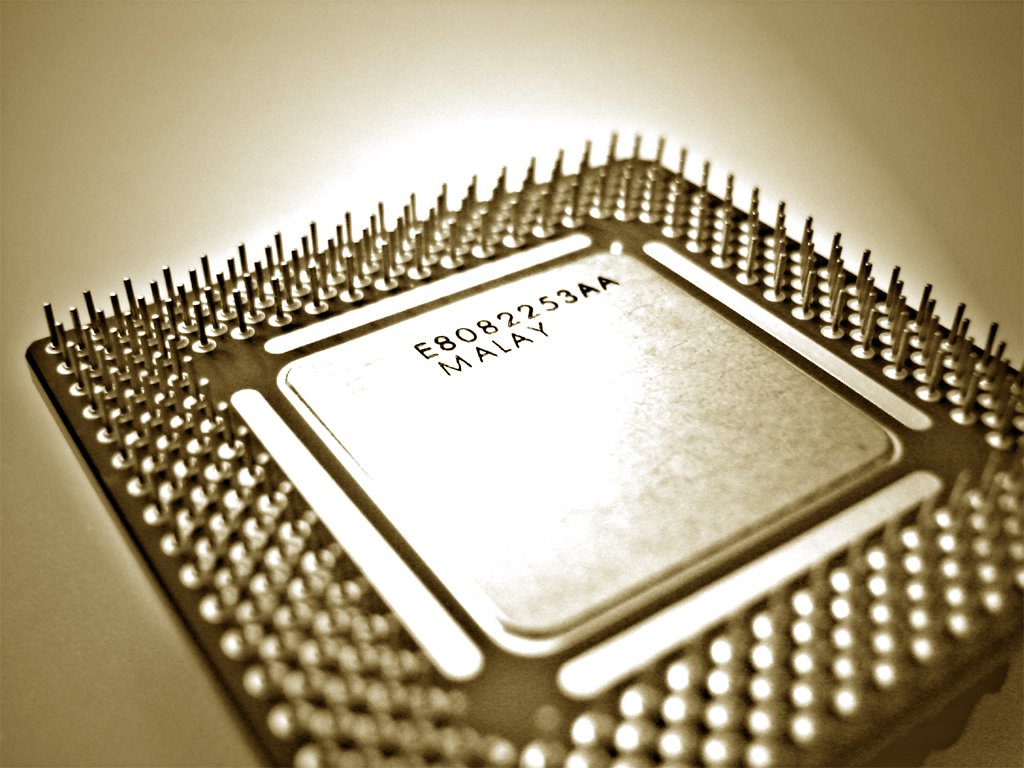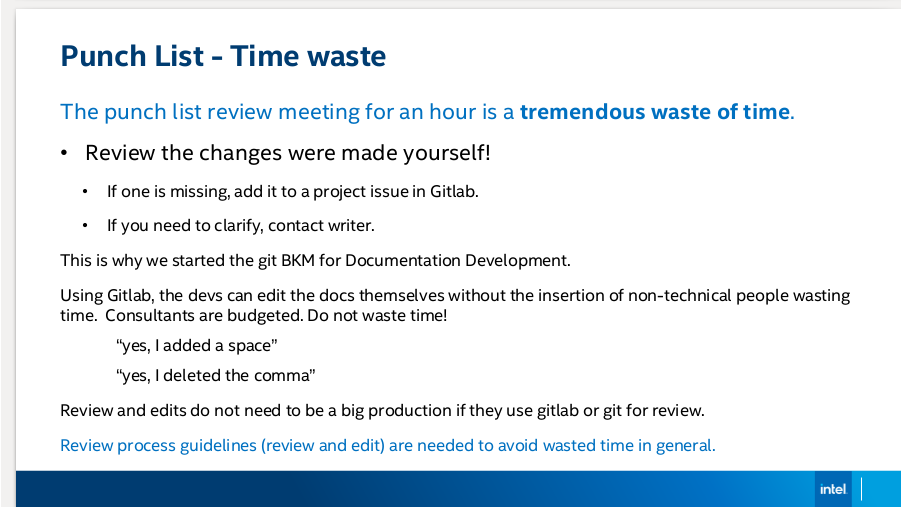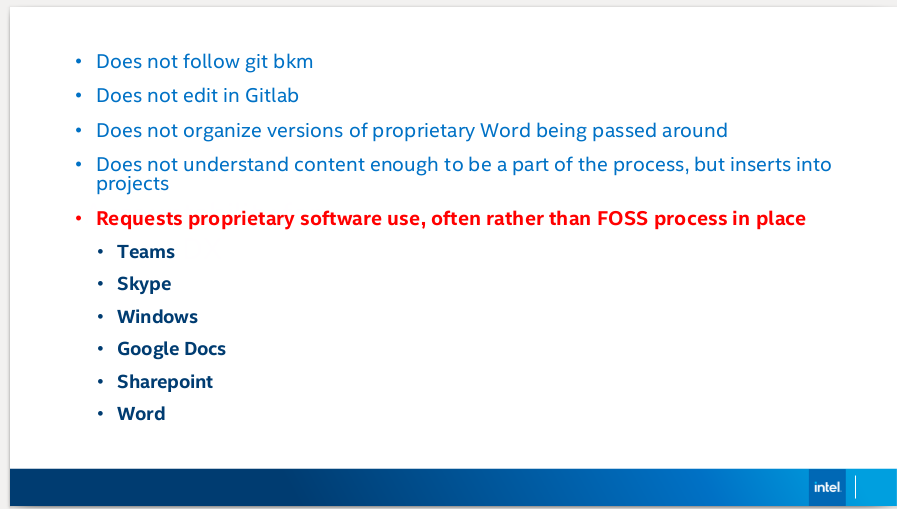

THIS ongoing series is only getting started (see introduction, Part I, Part II, and Part III). What we're going to show over the next few days or weeks is that Intel's attitude towards Linux is mostly faked or half-hearted. People love mocking the lie that is "Microsoft loves Linux", but what about Intel?
"What we’re going to show over the next few days or weeks is that Intel’s attitude towards Linux is mostly faked or half-hearted."A person who knows Intel from the inside has told us (earlier this week), "as for Intel, I have seen them insert x86 assembly code into an xorg driver from one release to another so it would stop building on non-x86 architectures [...] until now it wouldn't matter because only integrated graphics have been available, but imagine them doing this kind of thing with their new discrete GPUs available on PCIE cards [...] so I would say Intel has been doing the Intel ♥ Linux for longer than Microsoft has been doing, but was just not seen as that, because the company was the so-called darling of the Linux world..."
The Linux Foundation and OSDL funding certainly contributed towards this (done for PR purposes, to keep geeks buying and deploying on Intel, based on false perceptions like openwashing).
"I think that Intel entering the market with GPUs is a good thing for the market," Ryan noted last night. "It's a duopoly right now where only AMD and Nvidia compete in the discrete GPU segment, and they only have to be good enough to try to outsell the other one, and Nvidia will never release an open source driver. More vendors means more choices. More choices mean better products and more competitive pricing, in theory. Microsoft's endgame is always that after they defeat the competition, they slink back into the comfortable spot of barely supporting that product, firing 90% of the developers, and letting it stagnate into another rotten mess full of security holes. Internet Explorer 6 went on for more than half a decade before a new version was out....with tabs and some minor improvements to CSS. IE 7 very much still went along with their previously stated policy of delivering new version with new versions of Windows, and making only small changes. They misread what the users of web browsers wanted. They figured "Oh they want tabs. We'll give them Internet Explorer with tabs. That'll shut 'em up!". For years, they told people on the inside who were asked about tabs that you didn't need tabs because the Windows shell would eventually group the windows."
Now, in the case of Intel (another monopolist and monopoly abuser), chips did not improve as much as they could. Lack of competition contributed to this.
Ryan noted again the Windows analogy (regarding "developer eXperience" or DX): "Might note that Windows Store was on the verge of failing completely, filled with fake, fraudulent, and misleading apps that would be removed as violating Apple's quality standards, until Microsoft made it so that developers could take a plain old Win32 desktop app, with basically no changes, put it in an AppX package, and host it in the store. So there are some real applications now, but they mostly ignore the UWP APIs completely, and they can miss important features. For example, VLC is there and can't play DVD or Blu Ray discs, and foobar2000 is there, but you can't add your own components to it, which is like 90% of the reason you'd use it. [...] some KDE applications are in the Windows Store. They suggest making a donation, but if you do it that way then Microsoft will take 30% of the donation away from them. Since the application is completely functional either way, if you want all of the money to go to KDE you should donate directly to KDE through their website. Then they talk of "developer experience". Even the real applications in their store. You ask the developer "Why put crippleware in the store?" and they go "Some people use Windows 10 in S Mode." If you want the real, full, application, you have to bypass the store and go directly to the developer. Microsoft's own policies on the Store are killing their own store. It's also pressuring people to give up and escape from S Mode because they can't actually use their computer if they don't. The whole idea of Windows Store has failed badly. If Microsoft had been more supportive and flexible, who knows? But the web is instead littered with developers recommending leaving S Mode so you can use their real application, not the Store version that doesn't have various features, or isn't allowed at all (like Firefox and Chrome). Microsoft, early on, banished other web browsers from their store. Their policies don't work, the restrictions don't work, because they have no clout. They're trying to spend Disney Bucks at Caesar's Palace, like Rick said in Rick & Morty."
Now, on to Intel. This is how developers feel about what's going on inside:

And notice what tools are being imposed:

"Additional Intel information," according to a source, shows that Intel really dislikes Free software. "There was a move from Drupal to Adobe Experience [Manager, Platform, 'Cloud'... Adobe Experience Cloud, formerly Adobe Marketing Cloud] early 2020 and a move from Gitlab to GitHub initiated."
So this is where Intel basically is headed. "Of course," the source notes, "that was before COVID-19."
"The DX report with indication of the DX team not using the required process (git, md, etc) was authored by a consultant who was leaving the same week of report distribution," the source adds. "The report was not distributed until the week the consultant already knew the contract was ended."
"The premature disabling of access was an unnecessary action, which I believe was to stop the distribution of the document and possibly discredit the consultant."
We're going to spend quite some time showing those things. The 'meat' of it is even more severe than anything we've shown so far. ⬆
Comments
Canta
2021-01-05 17:57:22
In part 3 he says that using older versions is windows culture. Which I myself pointed out in an article of mine you kindly posted here in Techrights, I don't remember which one. But my point there was that the constant change is breaking things, and thus we are becoming tired of change and just want to keep our old versions of software. Ryan, on the other hand, seems to imply that not being on the edge of software is somehow being unprofessional.
Which, if we're talking about intel, I may concede: they're a behemoth, not just a guy trying to make a living or just doing their stuff like any of us. Intel has a different responsability, and unmeasurable resources: they CAN do it, and most likely SHOULD do it. So, not a big deal here regarding Ryan's oppinion.
However, here in part 4, he talks about competition in the gpu world, and how that could be a good thing because of the otherwise duopoly nvidia/amd, and here I can't just take it like that. That's just liberal economic thinking, which is the same thing I didn't liked to interpret from the software adeaquation before.
This is the thing: our problem is not "lack of choice", but lack of regulation. Competition did NOTHING against planned obsolescense, and most likely actually accelerated it with segmentation and always looking for novelties. What we need is stuff like the ones the EU is trying to do with mobile phones manufacturers, not "more players". I mean: I couln't care less if there's a single player, as long as that player behave by the rules of the people. And people doesn't choose CEOs: they choose goverments to make regulations.
It's tricky, I know. Have no idea of how to make that happen. But if something is certain is that the neoliberal common sense is the problem, not the solution.